In this article:
A ton of options are available in the cookware section nowadays, but those who are health conscious still prefer to use cast iron pans. This is because of the benefits that come with cooking in cast iron pans.
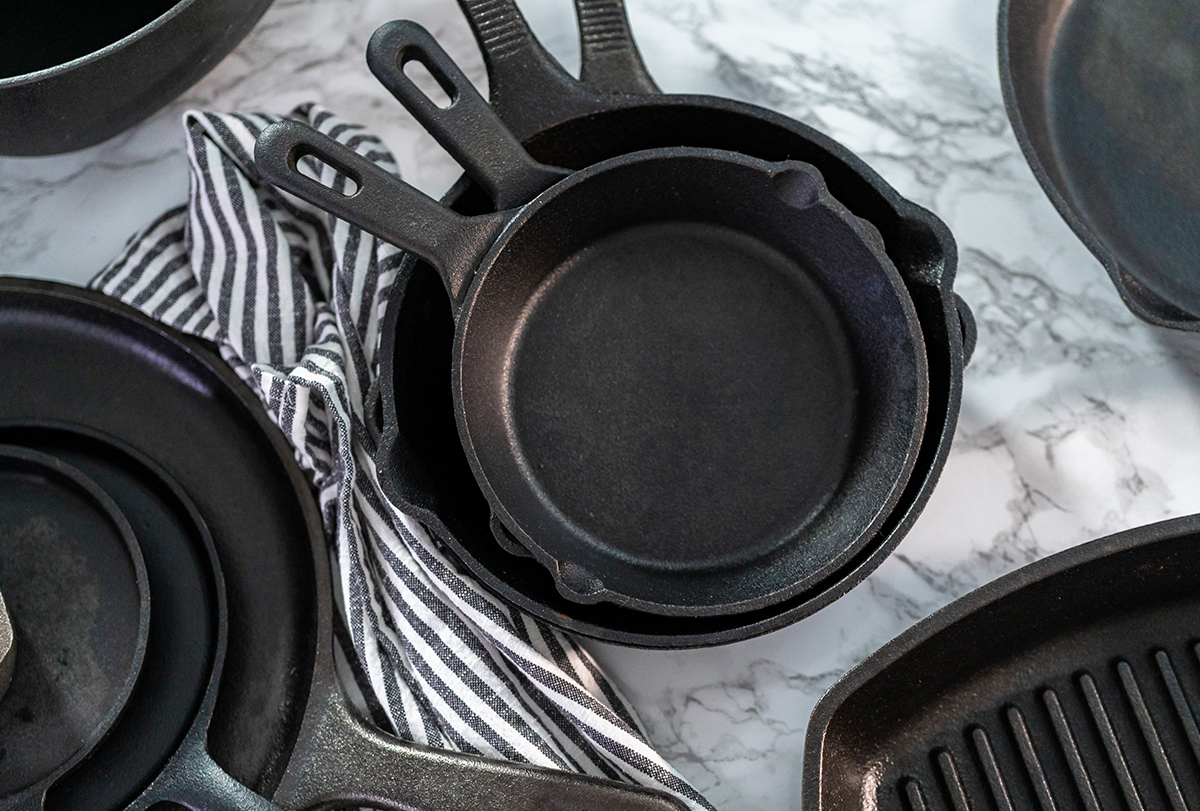
If you’ll know all the good things associated with the use of cast iron pans, you’d switch your cookware for them too.
Even health experts have shared their opinion on using cast iron pans and how it is great for cooking and your health. Not only that but they are also economically viable as you can find them for cheap at your local stores. (1)
Cast Iron Pans: What You Need to Know
Here are some facts about cast iron pans that you should know.
1. Seasoning the cast iron pan
Seasoning cast iron pans refers to applying a coat of oil to the pan to make it naturally nonstick for easier and healthier cooking.
Here’s how you can do it:
- Scrub your cast iron pan with water and let it dry.
- Apply oil and place it upside down in the oven.
- Let it bake in the oven for an hour and then let it cool down.
You may have to repeat the process until the pan becomes matte. When it becomes dull or dry after many uses, you may need to season the pan again.
2. Scrubbing the cast iron pan
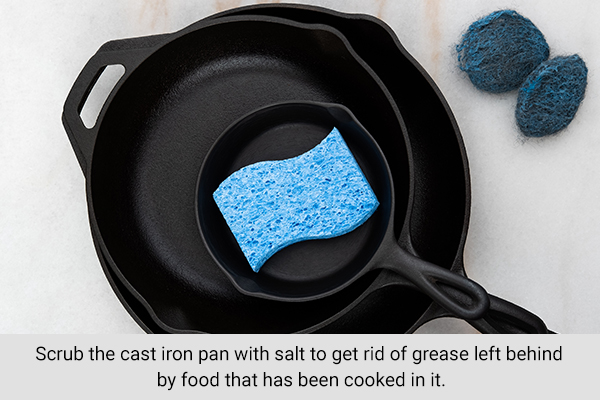
Scrub the cast iron pan with salt to get rid of grease left behind by food that has been cooked in it.
Here’s how you can do it:
- Warm the pan, sprinkle salt on it, and add water.
- Scrub it gently using a sponge to remove any grease.
- Rinse it with water and let it dry.
Note: To prevent rusting of the cast iron pan, you can cover it with a layer of oil or paper towel when storing it.
3. Does not emit toxic fumes
One good thing about cast iron pans is that when you use them, you do not get exposed to toxic fumes, which is good for your health.
A lot of other cookware materials such as aluminum and Teflon can be bad for the health because of the toxic fumes they emit when heated or scratched. These toxins also leach into your food, which can pose health problems such as respiratory issues and digestive disorders. (2)
4. Works just like a nonstick pan
If you season your cast iron pan correctly, you can use it like stick-free cookware. The oil used for seasoning the pan makes it nonstick naturally. This is why when you cook food in it, you don’t have to use a lot of oil.
But for its nonstick quality to last, you have to season it whenever required.
5. Only gets better with time
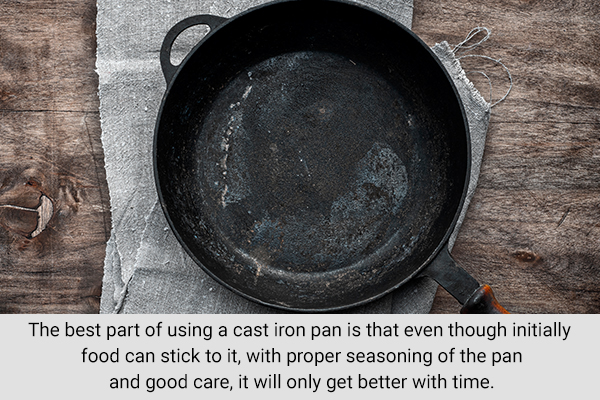
The best part of using a cast iron pan is that even though initially food can stick to it, with proper seasoning of the pan and good care, it will only get better with time. A quick good scrub will make it good as new after usage.
For seasoning the pan, flaxseed oil is the best.
6. Durable
Cast iron pans have been used for thousands of years for cooking. They don’t scratch and get damaged that easily even if you use them daily. They’re not broken easily, and if taken care of, they can last for years and years.
7. Antiquity
Cast iron pans have been used as cookware for thousands of years. You can see these pieces on display for their antiquity. Thus, using them adds a little bit of old-world charm to your home while also being a healthy decision.
8. Works great on high heat
Cast iron pans evenly distribute heat on the cookware surface. It can be used for various types of high-heat cooking methods including frying, baking, roasting, and sautéing.
Since cast iron pans can be used on multiple heat levels and any heat source without causing damage, it is a perfect cookware to have in your home.
9. Cleaning it while warm
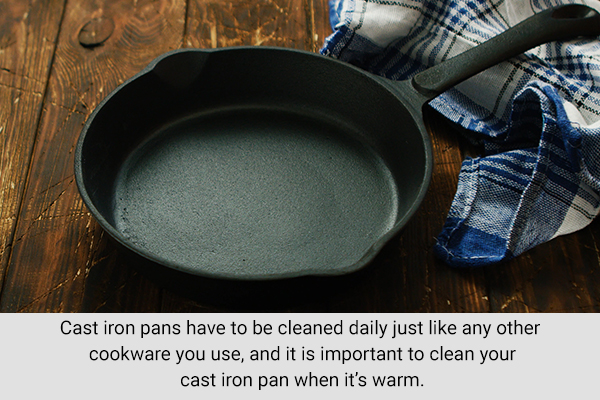
Cast iron pans have to be cleaned daily just like any other cookware you use, and it is important to clean your cast iron pan when it’s warm. Letting the cast iron pan cool down before cleaning will dry out the waste particles, making them harder to remove.
To effectively clean a cast iron pan, all you have to do is wipe it with a towel while it’s still warm. Do not use metal bristles to clean it.
10. Rich in iron
Cast iron pans can add iron to your food whenever you cook in them. Iron is an important part of the diet and is much needed by the body. Iron deficiency can cause issues such as: (3)
- Sleep disruption
- Anemia
- Muscle weakness
- Period pain
A 2013 research showed that food cooked in iron pots tends to have a pronounced effect on iron levels in children. So, if implemented correctly, such cooking habits can lead to decreased cases of iron deficiency in children, which leads to anemia. The same is also applicable to pregnant women. (4)
Additional Tips
- Avoid using utensils made of metals on the cast iron pan.
- Avoid cooking acidic food in your cast iron pan.
- Don’t get fooled by marketing gimmicks. Modern cast iron pans are as good as older or antique cast iron pans.
- Do not wash your cast iron pan with soap.
Most-Asked Questions About Cast Iron Pans
My pan is rusting. How can I restore it?
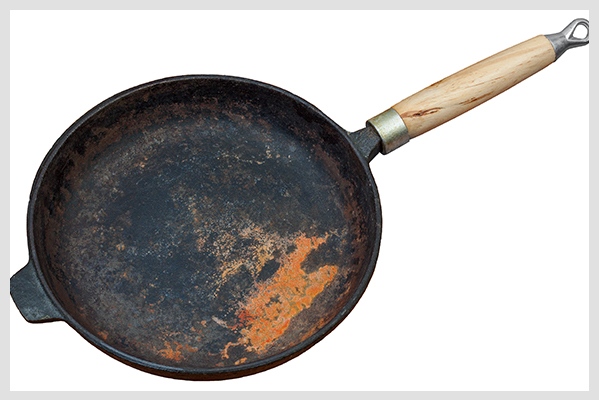
Since cast iron pans are made of iron, it is very common for them to rust when in contact with air and moisture. Therefore, to prevent rusting, it is important to season them properly with vegetable or animal oil.
What should I not cook in a cast iron pan?
Avoid using cast iron pans for cooking acidic food such as tomato sauce as it’ll damage the pan seasoning and alter the taste of the dish.
How do I store my cast iron pan?
Store your cast iron pan after it has completely dried. It is also helpful to put a paper towel on it before you store it, and keep it away from moisture to protect its surface from rusting.
Final Word
Cast iron pans are great cookware that can be used daily. It is a very healthy cookware option, and with much care, it can be used easily and regularly.
Use, store, and care for your cast iron pan the proper way and you will be very happy with this cookware for many years.
- Was this article helpful?
- YES, THANKS!NOT REALLY


